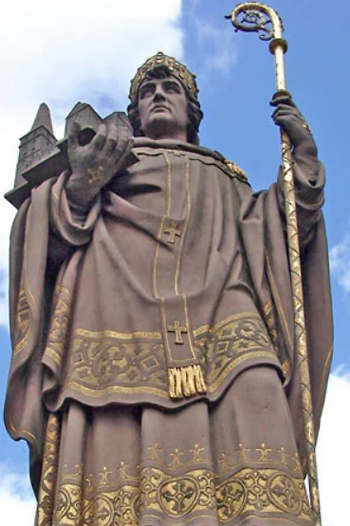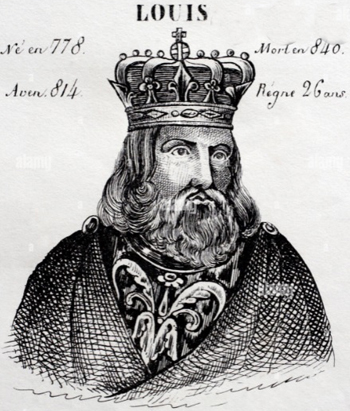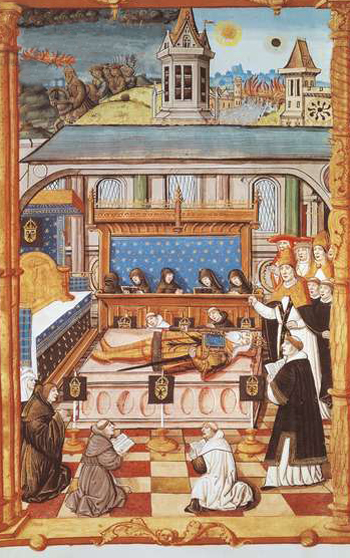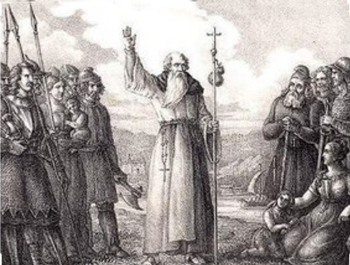Saints of the Day
 |
 |
 |
 |
 |
 |
 |
St. Ansgar (Anscharius) of Bremen
February 3
Biographical selection:
In 847 Emperor Louis the Fair (778-840) was looking for a missionary to evangelize pagan Denmark and Norway to attend to a request of Harald, King of Denmark, who had converted to the Faith with all his family.
 St. Wala, Abbot of Corbie, suggested the name of Ansgar, a Benedictine monk of exceptional virtue whose piety had only increased after Charlemagne's death, which had left a profound impression on him.
St. Wala, Abbot of Corbie, suggested the name of Ansgar, a Benedictine monk of exceptional virtue whose piety had only increased after Charlemagne's death, which had left a profound impression on him.
This holy religious received an order to appear at the court. When he arrived, Wala proposed that he go to Denmark, declaring, however, that it was his choice to accept or reject the mission. Ansgar, who sought only the opportunity to give more glory to God, accepted it with joy. The King was pleased and edified.
When, however, the news became public, there were some who criticized the decision, affirming that a good religious should not be taken from his studies in the Kingdom to minister to idolatrous barbarians and conquer other lands for God. Others attributed to the Emperor political intentions and violently criticized the decision. Still others tried to induce the Emperor to rescind his plan.
Thus does the work of God always encounter opposition. At times the work is thwarted simply because someone is upset to see others do a good that he is personally unable to do.
Ansgar, unwilling to respond to such vain words, retired in solitude to a place near Aix-la-Chapelle to prepare himself for his mission, and delivered himself to reading and prayer.
Comments of Dr. Plinio:
Unfortunately this selection leaves us in suspense, because it ends when the Saint was preparing to carry out his mission. It gives us only the elements to make a comment on this specific historic scene, which illustrates how the vocation of missionary sprouted in those remote epochs and difficult times.
 Here are some comments that come to mind:
Here are some comments that come to mind:
1. The figure of King Harald of Denmark who converted with his entire family and who also wanted to convert his people is very edifying. It is another figure in the grandiose gallery of Kings who converted and founded nations, and who thus played such an important role in the History of the Middle Ages.
Those Kings founded nations and some were Saints, like those other Saints who founded religious orders and spiritual families. We see that all the fecundity of the Middle Ages was born from the only fountain that is fecund for the work of salvation and for Christian Civilization, which the fountain of the Saints of the Church of God.
2. It is also interesting to see the zeal of the Emperor Louis the Fair for the missions. He was Emperor of the Holy Roman Empire, exercising his role to preserve and stimulate the Faith. So he went to the Abbot of Corbie, called Wala, to ask him who would be the right missionary to send to the North in response to the request of the good King Harald.
His answer was that the monk Ansgar would be fit for this mission. He was very good, and had grown in virtue even more after the death of Charlemagne, a fact that had impressed him very much. How beautiful to see a man who sanctifies himself, who makes great progress in his spiritual life after seeing the death of the great Charlemagne!
 How marvelous is an Emperor whose death is so edifying that a Saint, like St. Ansgar, took large steps in his spiritual life after being present at his death!
How marvelous is an Emperor whose death is so edifying that a Saint, like St. Ansgar, took large steps in his spiritual life after being present at his death!
You see here the union of the Empire with sanctity, the accord of the Empire with the Priesthood in order to realize the mission of Christian Civilization and the mission of the Church at a very high level. It is a true marvel!
Then, what happened to Ansgar? He arrived at the court and the mission to Denmark was proposed to him by the Abbot in front of the Emperor, which would be equivalent to the Emperor himself inviting him. It was made clear to him that this was not an order imposed by either the Emperor or the Abbot. It was his choice. Ansgar immediately chose to go and accepted.
Now, you see division entering the picture. The Saints always divide; there is no Saint who had not caused great division around himself. Take, for instance, Dom Bosco. He spent all his life caring for boys and, therefore, did a work that could only be supported, even if he were also a vigorous polemicist against Protestantism. Even Dom Bosco suffered murder attempts by assassins with pistols. There is no Saint who has not divided.
Why these divisions? It is because while some praised the decision of St. Ansgar, others censured him. Among other arguments, they claimed it was madness for him to leave the comfort of his life of studies to go to minister to idolatrous barbarians. Some of you could think that since the Saint lived in the Middle Ages, everything should tend toward sanctity. This would be an error.
It is certain that at that time sanctity was preached by the Church and protected by the Empire, but there were still many bad people who openly combated the good. Impiety existed and the impious were very bold. What characterized the Middle Ages is that sanctity almost always won, the cause of the good almost always conquered because the Saints defended the good cause with heroism.
 It is different from today when the defender of the good cause are weak and cowards and only a small minority courageously defends the good cause.
It is different from today when the defender of the good cause are weak and cowards and only a small minority courageously defends the good cause.
In the description you see that those with a worldly spirit, opportunism and the attachment to comfort were the ones censuring the true heroism of St. Ansgar in his decision to go to convert Denmark.St. Ansgar did not take these arguments into the least consideration. On the contrary, he retired to a place near Aix-la-Chapelle, the city where Charlemagne had died, and dedicated himself to prayer and reading to prepare for his mission.
We do not know the rest of St. Ansgar's life, except for these few facts: that he became a Bishop, that he is a canonized Saint, and that he enjoys the glory of God in Heaven and the glory of the Altars on this earth. That is, he was victorious: he took Christianity to Denmark. This suffices for us to tribute to St. Ansgar all the glory possible.


The Saint of the Day features highlights from the lives of saints based on comments made by the late Prof. Plinio Corrêa de Oliveira. Following the example of St. John Bosco who used to make similar talks for the boys of his College, each evening it was Prof. Plinio’s custom to make a short commentary on the lives of the next day’s saint in a meeting for youth in order to encourage them in the practice of virtue and love for the Catholic Church. TIA thought that its readers could profit from these valuable commentaries.
The texts of both the biographical data and the comments come from personal notes taken by Atila S. Guimarães from 1964 to 1995. Given the fact that the source is a personal notebook, it is possible that at times the biographic notes transcribed here will not rigorously follow the original text read by Prof. Plinio. The commentaries have also been adapted and translated for TIA’s site.
In 847 Emperor Louis the Fair (778-840) was looking for a missionary to evangelize pagan Denmark and Norway to attend to a request of Harald, King of Denmark, who had converted to the Faith with all his family.

St. Ansgar of Bremen (801-865), Apostle of the North
This holy religious received an order to appear at the court. When he arrived, Wala proposed that he go to Denmark, declaring, however, that it was his choice to accept or reject the mission. Ansgar, who sought only the opportunity to give more glory to God, accepted it with joy. The King was pleased and edified.
When, however, the news became public, there were some who criticized the decision, affirming that a good religious should not be taken from his studies in the Kingdom to minister to idolatrous barbarians and conquer other lands for God. Others attributed to the Emperor political intentions and violently criticized the decision. Still others tried to induce the Emperor to rescind his plan.
Thus does the work of God always encounter opposition. At times the work is thwarted simply because someone is upset to see others do a good that he is personally unable to do.
Ansgar, unwilling to respond to such vain words, retired in solitude to a place near Aix-la-Chapelle to prepare himself for his mission, and delivered himself to reading and prayer.
Comments of Dr. Plinio:
Unfortunately this selection leaves us in suspense, because it ends when the Saint was preparing to carry out his mission. It gives us only the elements to make a comment on this specific historic scene, which illustrates how the vocation of missionary sprouted in those remote epochs and difficult times.

Emperor Louis the Fair showed zeal for the Faith in responding to the request of King Harald
1. The figure of King Harald of Denmark who converted with his entire family and who also wanted to convert his people is very edifying. It is another figure in the grandiose gallery of Kings who converted and founded nations, and who thus played such an important role in the History of the Middle Ages.
Those Kings founded nations and some were Saints, like those other Saints who founded religious orders and spiritual families. We see that all the fecundity of the Middle Ages was born from the only fountain that is fecund for the work of salvation and for Christian Civilization, which the fountain of the Saints of the Church of God.
2. It is also interesting to see the zeal of the Emperor Louis the Fair for the missions. He was Emperor of the Holy Roman Empire, exercising his role to preserve and stimulate the Faith. So he went to the Abbot of Corbie, called Wala, to ask him who would be the right missionary to send to the North in response to the request of the good King Harald.
His answer was that the monk Ansgar would be fit for this mission. He was very good, and had grown in virtue even more after the death of Charlemagne, a fact that had impressed him very much. How beautiful to see a man who sanctifies himself, who makes great progress in his spiritual life after seeing the death of the great Charlemagne!

Being present at the death of Charlemagne made a lasting impression on the monk Ansgar
You see here the union of the Empire with sanctity, the accord of the Empire with the Priesthood in order to realize the mission of Christian Civilization and the mission of the Church at a very high level. It is a true marvel!
Then, what happened to Ansgar? He arrived at the court and the mission to Denmark was proposed to him by the Abbot in front of the Emperor, which would be equivalent to the Emperor himself inviting him. It was made clear to him that this was not an order imposed by either the Emperor or the Abbot. It was his choice. Ansgar immediately chose to go and accepted.
Now, you see division entering the picture. The Saints always divide; there is no Saint who had not caused great division around himself. Take, for instance, Dom Bosco. He spent all his life caring for boys and, therefore, did a work that could only be supported, even if he were also a vigorous polemicist against Protestantism. Even Dom Bosco suffered murder attempts by assassins with pistols. There is no Saint who has not divided.
Why these divisions? It is because while some praised the decision of St. Ansgar, others censured him. Among other arguments, they claimed it was madness for him to leave the comfort of his life of studies to go to minister to idolatrous barbarians. Some of you could think that since the Saint lived in the Middle Ages, everything should tend toward sanctity. This would be an error.
It is certain that at that time sanctity was preached by the Church and protected by the Empire, but there were still many bad people who openly combated the good. Impiety existed and the impious were very bold. What characterized the Middle Ages is that sanctity almost always won, the cause of the good almost always conquered because the Saints defended the good cause with heroism.

St. Ansgar preaching to the Danes; he is the patron of Denmark, Germany & Iceland
In the description you see that those with a worldly spirit, opportunism and the attachment to comfort were the ones censuring the true heroism of St. Ansgar in his decision to go to convert Denmark.St. Ansgar did not take these arguments into the least consideration. On the contrary, he retired to a place near Aix-la-Chapelle, the city where Charlemagne had died, and dedicated himself to prayer and reading to prepare for his mission.
We do not know the rest of St. Ansgar's life, except for these few facts: that he became a Bishop, that he is a canonized Saint, and that he enjoys the glory of God in Heaven and the glory of the Altars on this earth. That is, he was victorious: he took Christianity to Denmark. This suffices for us to tribute to St. Ansgar all the glory possible.

 | |
|
|
The texts of both the biographical data and the comments come from personal notes taken by Atila S. Guimarães from 1964 to 1995. Given the fact that the source is a personal notebook, it is possible that at times the biographic notes transcribed here will not rigorously follow the original text read by Prof. Plinio. The commentaries have also been adapted and translated for TIA’s site.


